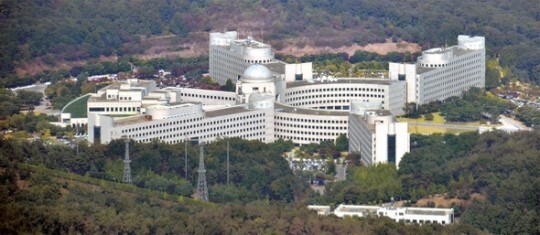hankyoreh
Links to other country sites 다른 나라 사이트 링크
NIS approves 2018 anti-espionage strategy

The National Intelligence Service (NIS) announced the review and approval of a national anti-espionage strategy for 2018 at a strategic meeting on Dec. 18. The plan, which includes targets and medium- to long-term strategies for state anti-espionage activities, signaled increased “spy vs. spy” efforts in the areas of security and industry in response to other countries’ intelligence activities against South Korea.
The national anti-espionage strategy approved by the NIS includes pan-governmental anti-espionage measures to respond to intelligence activities by foreign organizations. The NIS plans to distribute it to around 439 institutions nationwide, including central government agencies, local governments, and public institutions.
“A recognition of the importance of anti-espionage activities among government employees and organic cooperation among institutions involved in combating espionage are essential to respond to the intense intelligence war under way around the world,” NIS director Suh Hoon said at the Dec. 18 meeting.
“The NIS will dedicate its full capacities going ahead exclusively to its proper national security duties, including anti-espionage activities and North Korea issues,” Suh added.
Anti-espionage activities, including the tracking, control, and prevention of foreign spying, are a key duty of state intelligence agencies. The activities involve defending against the leaking of state secrets or industry technology by government or public institution staffers, whom foreign spies frequently view as targets for approaching and recruitment. This also means the targets of anti-espionage activities include not only North Korea (anti-communist espionage activities), but all other countries, including allies.
In August, the NIS underwent a restructuring that dissolved its domestic intelligence division and increased exclusive staffing for foreign intelligence activity response and protections of high-tech and defense industry technology and military secrets under its third deputy director for anti-espionage activities.
By Kim Nam-il, staff reporter
Please direct questions or comments to [english@hani.co.kr]

Editorial・opinion
![[Column] Season 2 of special prosecutor probe may be coming to Korea soon [Column] Season 2 of special prosecutor probe may be coming to Korea soon](https://flexible.img.hani.co.kr/flexible/normal/500/300/imgdb/original/2024/0426/3317141030699447.jpg) [Column] Season 2 of special prosecutor probe may be coming to Korea soon
[Column] Season 2 of special prosecutor probe may be coming to Korea soon![[Column] Park Geun-hye déjà vu in Yoon Suk-yeol [Column] Park Geun-hye déjà vu in Yoon Suk-yeol](https://flexible.img.hani.co.kr/flexible/normal/500/300/imgdb/original/2024/0424/651713945113788.jpg) [Column] Park Geun-hye déjà vu in Yoon Suk-yeol
[Column] Park Geun-hye déjà vu in Yoon Suk-yeol- [Editorial] New weight of N. Korea’s nuclear threats makes dialogue all the more urgent
- [Guest essay] The real reason Korea’s new right wants to dub Rhee a founding father
- [Column] ‘Choson’: Is it time we start referring to N. Korea in its own terms?
- [Editorial] Japan’s rewriting of history with Korea has gone too far
- [Column] The president’s questionable capacity for dialogue
- [Column] Are chaebol firms just pizza pies for families to divvy up as they please?
- [Column] Has Korea, too, crossed the Rubicon on China?
- [Correspondent’s column] In Japan’s alliance with US, echoes of its past alliances with UK
Most viewed articles
- 1‘We must say no’: Seoul defense chief on Korean, USFK involvement in hypothetical Taiwan crisis
- 2N. Korean delegation’s trip to Iran shows how Pyongyang is leveraging ties with Moscow
- 3[Column] Season 2 of special prosecutor probe may be coming to Korea soon
- 4‘Weddingflation’ breaks the bank for Korean couples-to-be
- 5[Column] Has Korea, too, crossed the Rubicon on China?
- 6[Editorial] New weight of N. Korea’s nuclear threats makes dialogue all the more urgent
- 7[Reportage] On US campuses, student risk arrest as they call for divestment from Israel
- 8Korea sees more deaths than births for 52nd consecutive month in February
- 9[Column] Park Geun-hye déjà vu in Yoon Suk-yeol
- 10[Guest essay] The real reason Korea’s new right wants to dub Rhee a founding father